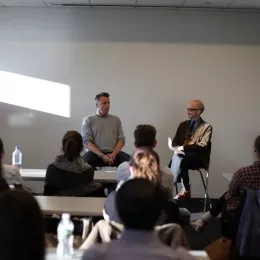“Will you do consulting for me?” It's a question we ICE chefs and faculty hear almost weekly from students and alumni (not to mention others outside of ICE hoping to go into the food business). After all, we are the teachers, mentors and experts who should know all the tips, tricks and likely pitfalls of launching a business—and most of the time we do. Like a great-on-paper first date, we are easy to fall for. However, before asking for our "hand in marriage", consider a lesson or two in consultant match-making.

To begin, if you are a current student, don’t even ask. It’s inappropriate for a faculty member to consult with your business, as it adversely affects the teacher/student relationship and compromises your educational experience. It’s like having an affair—the teacher is occupied, married to the school. If you really want to hire your instructor, wait until they're no longer grading your work.

Next, are you sure that faculty member is "the one"? You know them, they know you, and all seems right. You've already imagined walking hand-and-hand into the sunrise to conquer new worlds of donuts, pâté and pasta. But despite our alluring and attractive talents and experience, are you sure we're right for you? Maybe so, but don't let lust interfere with clear thinking. Do a background check on our experience and qualifications. Compare. Ask around. Requirements for a good consultant include:
- Independent – he/she has no other agenda than to help you succeed
- Creative – an outsider who is not bound by a relationship with you or preconceived ideas
- Experienced – has not only done it before, but has a proven track record in teaching others to succeed as well
- Paid a monetary fee – The relationship should be based on clear boundaries, a fiduciary "arms-length"
- Energizing – a fresh new influence
- The Bad Guy – can play good cop/bad cop, respectfully letting you and your team know when you are wrong

In short, engage other consultants before going straight to your teacher. But—as with a lawyer, doctor or blind date—don't forget the value of a personal recommendation. That means Google may not be the best place to start. Here's a few basics for launching your search:
- Find someone local – He or she knows the local culture, market and competition and will be there when the engagement ends (not flying back to a foreign land).
- Experience counts – It may cost more, but you get what you pay for. Make sure the consultant has intense, intimate knowledge of your type of business and that promised results are quickly obtainable.
- Compare – Self-employed consultants often provide the best value and experience, but may have trouble balancing more than one job at the same time. A big name likely costs more, but will provide financial recourse if a job goes wrong and may provide a collection of talents from a deep bench of consultants, allowing for multiple simultaneous engagements.
- Know who you're hiring – Occasionally a consultant will tap into their network and only supervise the project.
- Get a written proposal – That means a clear work plan, timing and fee statement—not just a handshake. Discuss expenses and maximum budget.
- Look for professionalism – Be sure their primary income comes from consulting (don't hire an equipment store clerk, broker or an insurance executive who consults on the side).
- Don’t be afraid– to ask for fee back up.
- Get bids – and compare them. Remember, consultants are creative, and having multiple proposals exposes you to ideas that may be enlightening.
If no one you know has used a consultant, try your local restaurant association or even the FSCI – Food Service Consultant International group. Then use Google to double-check your research. In the end, you may still use your favorite faculty member as a consultant, but at least you’ve checked the landscape before you tie the knot.

Now for the big question – how much? Consultants either charge by the day, the hour or the project. Occasionally there are engagements where a fee is composed of a piece of the company ownership or a percent of sales/savings, but these aren’t the norm. The more experienced the consultant the higher the fee, but in the end, the fee is based on time the project takes—and experience may mean a shorter time frame.
Hourly rates can run from $50 to $350 per hour depending on the type of engagement and whether you're working with a big company or individual consultant. Travel time to a site may or may not be included. Basic expenses also may or may not be a part of a fee. Anytime a consultant produces a written document, fees for a project will be higher. Eliminate a report in favor of a discussion outline.
Remember, anything you can do to reduce a consultant’s time will save you money—whether doing your own groundwork or limiting the scope of their engagement. Last but not least, consider the consultant’s current work. You need to be the star of their show.
If you've passed all these hurdles and still want to engage a former faculty member, go ahead. A good consultant can add experience, knowledge and even motivation to almost any project—just be sure he or she is the one for you.



